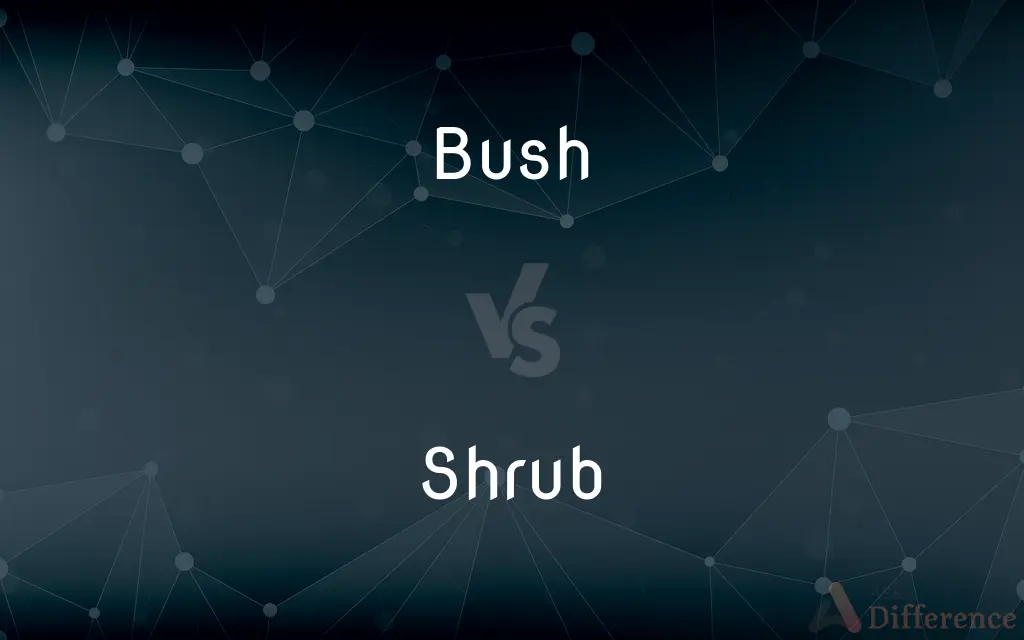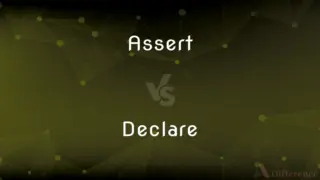Bush vs. Shrub — What's the Difference?
Edited by Tayyaba Rehman — By Fiza Rafique — Updated on November 1, 2023
A bush is a wild or uncultivated dense plant, while a shrub is a cultivated, smaller woody plant.

Difference Between Bush and Shrub
Table of Contents
ADVERTISEMENT
Key Differences
A bush typically refers to a low, densely branched plant. In common language, a bush is often considered wild or naturally occurring vegetation. A shrub, conversely, implies a more cultivated, garden-friendly plant, also low and densely branched but often maintained by human intervention.
Bushes are characterized by their thick, woody stems and branches that start near the base. They are commonly found in a variety of natural landscapes. Shrubs are also woody plants but are used in landscaping and are pruned and shaped for aesthetic or functional purposes.
In horticulture, the term shrub is used to define a category of woody plants, while in everyday language, bush may often imply an untamed, larger, or even overgrown condition. A shrub is usually considered to have been planted intentionally as part of a garden or landscape design.
While both can be similar in size and shape, bushes are often associated with wilderness and rural areas. Shrubs are tied to the domestic sphere, contributing to the manicured appearance of spaces. This distinction, however, is more about connotation and usage than strict botanical criteria.
The terms bush and shrub may sometimes be used interchangeably due to their physical similarities. However, the context often dictates preference: bush for wilder vegetation, and shrub for plants that are part of deliberate horticulture.
ADVERTISEMENT
Comparison Chart
Connotation
Wild, natural.
Cultivated, landscaped.
Location
Wilderness, rural areas.
Gardens, parks, urban areas.
Cultivation
Typically uncultivated.
Often cultivated and maintained.
Size
Can be larger, less maintained.
Usually smaller, pruned.
Usage
General, non-specific.
Specific, horticultural.
Compare with Definitions
Bush
A wild or naturally occurring woody plant.
Hikers found berries growing on a bush.
Shrub
A woody plant smaller than a tree, often found in gardens.
She trimmed the shrub into a spherical shape.
Bush
A general, non-scientific term for dense plants.
She loved the sight of a flowering bush in spring.
Shrub
A cultivated plant used in landscape design.
The gardener recommended a shrub for that corner of the yard.
Bush
A shrub or clump of shrubs with stems of moderate length
A rose bush
Shrub
A plant that is maintained and pruned.
They planted a new shrub near the walkway for decoration.
Bush
(especially in Australia and Africa) wild or uncultivated country
They have to spend a night camping in the bush
Shrub
Horticulturally, a category of woody plants.
This species of shrub blooms with pink flowers in the summer.
Bush
A luxuriant growth of thick hair or fur
A childish face with a bush of bright hair
Shrub
A term specific to the gardening and landscaping domain.
They chose shrubs to line the front path for a formal look.
Bush
A metal lining for a round hole, especially one in which an axle revolves.
Shrub
A shrub (or bush, but this is more of a gardening term) is a small- to medium-sized perennial woody plant. Unlike herbaceous plants, shrubs have persistent woody stems above the ground.
Bush
A sleeve that protects an electric cable where it passes through a panel.
Shrub
A woody plant of relatively low height, having several stems arising from the base and lacking a single trunk; a bush.
Bush
Spread out into a thick clump
Her hair bushed out like a halo
Shrub
A beverage made from fruit juice, sugar, and a liquor such as rum or brandy.
Bush
A low shrub with many branches.
Shrub
A woody plant smaller than a tree, and usually with several stems from the same base.
Bush
A thick growth of shrubs; a thicket.
Shrub
(Kenyan English) A word mispronounced by replacing some consonant sounds with others of a similar place of articulation due to interference from one's knowledge of an indigenous Kenyan language.
Bush
Land covered with dense vegetation or undergrowth.
Shrub
A liquor composed of vegetable acid, fruit juice (especially lemon), sugar, sometimes vinegar, and a small amount of spirit as a preservative. Modern shrub is usually non-alcoholic, but in earlier times it was often mixed with a substantial amount of spirit such as brandy or rum, thus making it a liqueur.
Bush
Land remote from settlement
The Australian bush.
Shrub
(obsolete) To lop; to prune.
Bush
A shaggy mass, as of hair.
Shrub
To mispronounce a word by replacing some consonant sounds with others of a similar place of articulation due to interference from one's knowledge of an indigenous Kenyan language.
Bush
Vulgar Slang A growth of pubic hair.
Shrub
A liquor composed of vegetable acid, especially lemon juice, and sugar, with spirit to preserve it.
Bush
A fox's tail.
Shrub
A woody plant of less size than a tree, and usually with several stems from the same root.
Bush
(Archaic) A clump of ivy hung outside a tavern to indicate the availability of wine inside.
Shrub
To lop; to prune.
Bush
(Obsolete) A tavern.
Shrub
A low woody perennial plant usually having several major branches
Bush
To grow or branch out like a bush.
Bush
To extend in a bushy growth.
Bush
To decorate, protect, or support with bushes.
Bush
To furnish or line with a bushing.
Bush
(Slang) Bush-league; second-rate
"Reviewers here have tended to see in him a kind of bush D.H. Lawrence" (Saturday Review).
Bush
(horticulture) A woody plant distinguished from a tree by its multiple stems and lower height, being usually less than six metres tall; a horticultural rather than strictly botanical category.
Bush
A shrub cut off, or a shrublike branch of a tree.
Bushes to support pea vines
Bush
(historical) A shrub or branch, properly, a branch of ivy (sacred to Bacchus), hung out at vintners' doors, or as a tavern sign; hence, a tavern sign, and symbolically, the tavern itself.
Bush
A person's pubic hair, especially a woman's.
Bush
(hunting) The tail, or brush, of a fox.
Bush
(archaic) A tavern or wine merchant.
Bush
(often with "the") Tracts of land covered in natural vegetation that are largely undeveloped and uncultivated.
Bush
(Australia) The countryside area of Australia that is less arid and less remote than the outback; loosely, areas of natural flora even within conurbations.
Bush
(New Zealand) An area of New Zealand covered in forest, especially native forest.
Bush
(Canadian) The wild forested areas of Canada; upcountry.
Bush
(Canadian) A woodlot or bluff on a farm.
Bush
(baseball) Amateurish behavior, short for "bush league behavior"
Bush
A thick washer or hollow cylinder of metal.
Bush
A mechanical attachment, usually a metallic socket with a screw thread, such as the mechanism by which a camera is attached to a tripod stand.
Bush
A piece of copper, screwed into a gun, through which the venthole is bored.
Bush
(intransitive) To branch thickly in the manner of a bush.
Bush
To set bushes for; to support with bushes.
To bush peas
Bush
To use a bush harrow on (land), for covering seeds sown; to harrow with a bush.
To bush a piece of land; to bush seeds into the ground
Bush
To become bushy (often used with up).
I can tell when my cat is upset because he'll bush up his tail.
Bush
(transitive) To furnish with a bush or lining; to line.
To bush a pivot hole
Bush
(Australia) Towards the direction of the outback.
On hatching, the chicks scramble to the surface and head bush on their own.
Bush
(colloquial) Not skilled; not professional; not major league.
They're supposed to be a major league team, but so far they've been bush.
Bush
A thicket, or place abounding in trees or shrubs; a wild forest.
Bush
A shrub; esp., a shrub with branches rising from or near the root; a thick shrub or a cluster of shrubs.
To bind a bush of thorns among sweet-smelling flowers.
Bush
A shrub cut off, or a shrublike branch of a tree; as, bushes to support pea vines.
Bush
A shrub or branch, properly, a branch of ivy (as sacred to Bacchus), hung out at vintners' doors, or as a tavern sign; hence, a tavern sign, and symbolically, the tavern itself.
If it be true that good wine needs no bush, 't is true that a good play needs no epilogue.
Bush
The tail, or brush, of a fox.
Bush
A lining for a hole to make it smaller; a thimble or ring of metal or wood inserted in a plate or other part of machinery to receive the wear of a pivot or arbor.
Bush
A piece of copper, screwed into a gun, through which the venthole is bored.
Bush
To branch thickly in the manner of a bush.
Bush
To set bushes for; to support with bushes; as, to bush peas.
Bush
To use a bush harrow on (land), for covering seeds sown; to harrow with a bush; as, to bush a piece of land; to bush seeds into the ground.
Bush
To furnish with a bush, or lining; as, to bush a pivot hole.
Bush
A low woody perennial plant usually having several major branches
Bush
A large wilderness area
Bush
Dense vegetation consisting of stunted trees or bushes
Bush
43rd President of the United States; son of George Herbert Walker Bush (born in 1946)
Bush
United States electrical engineer who designed an early analogue computer and who led the scientific program of the United States during World War II (1890-1974)
Bush
Vice President under Reagan and 41st President of the United States (born in 1924)
Bush
Hair growing in the pubic area
Bush
Provide with a bushing
Bush
Not of the highest quality or sophistication
Bush
A large, dense collection of shrubs.
The children played hide and seek behind the bush.
Bush
A term for rural, non-cultivated vegetation.
They went camping out in the bush.
Bush
An informal term for thick, unruly vegetation.
Their backyard was overgrown with bush.
Common Curiosities
Do gardeners use both terms interchangeably?
They might, though "shrub" is preferred in a gardening context.
Are bushes always larger than shrubs?
Not necessarily, but bushes can grow larger if left untamed.
Can a plant be both a bush and a shrub?
Yes, depending on its growth condition and usage.
Is a bush always found in the wild?
Often, but not exclusively; some bushes are also part of landscaped areas.
Are all shrubs small?
Most are smaller than trees but can vary in size.
Do shrubs have a defined shape?
They can, especially if pruned and maintained for landscaping.
Can the term 'bush' refer to uncultivated land?
Yes, especially in phrases like "the Australian bush."
Is a bush the same as a shrub?
They are similar, but "bush" often implies wild growth, while "shrub" is usually cultivated.
Do shrubs require more care than bushes?
Generally, yes, since shrubs are often part of designed landscapes.
Are there shrubs that resemble trees?
Yes, some shrubs can be tree-like if they grow tall enough.
Can bushes be used in landscaping?
Yes, though they may require more maintenance to fit a designed space.
Is the term 'bush' more common in certain regions?
Yes, in some regions "bush" refers to rural, wild areas.
Are there flowering bushes and shrubs?
Absolutely, many species of both bushes and shrubs produce flowers.
How do you decide whether to call a plant a bush or a shrub?
It often depends on its growth and context within the landscape.
Are shrubs considered easier to manage than bushes?
Typically, because their growth is often controlled and they are regularly maintained.
Share Your Discovery

Previous Comparison
Assert vs. Declare
Next Comparison
Zabbix vs. NagiosAuthor Spotlight
Written by
Fiza RafiqueFiza Rafique is a skilled content writer at AskDifference.com, where she meticulously refines and enhances written pieces. Drawing from her vast editorial expertise, Fiza ensures clarity, accuracy, and precision in every article. Passionate about language, she continually seeks to elevate the quality of content for readers worldwide.
Edited by
Tayyaba RehmanTayyaba Rehman is a distinguished writer, currently serving as a primary contributor to askdifference.com. As a researcher in semantics and etymology, Tayyaba's passion for the complexity of languages and their distinctions has found a perfect home on the platform. Tayyaba delves into the intricacies of language, distinguishing between commonly confused words and phrases, thereby providing clarity for readers worldwide.















































